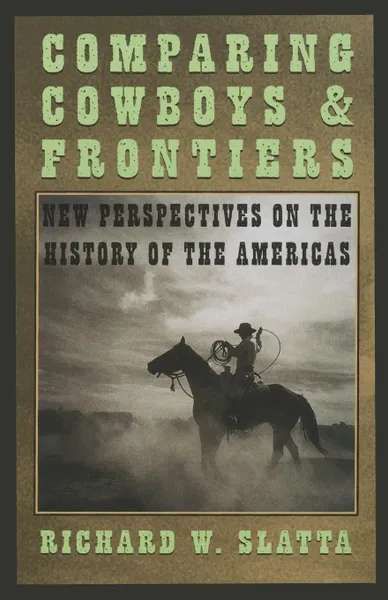Comparing Cowboys and Frontiers 12+
Автор: Richard W. Slatta
1997
338 страниц
Категория: Научная литература
ISBN: 9780806133843
Язык: Английский
Где найти книгу?
📘 Historians of the American west, perhaps inspired by NAFTA and Internet communication, are expanding their intellectual horizons across borders north and south. This collection of essays functions as a how-to guide to comparative frontier research in the American. Frontiers specialist Richard W. Slatta presents topics, techniques, and methods that will intrigue social-science professionals and western-history buffs alike as he explores the frontiers of North and South America from Spanish colonial days into the twentieth century.
The always popular cowboy is joined by the fascinating gaucho, llanero, vaquero, and charro as Slatta compares their work techniques, roundups, songs, tack, lingo, equestrian culture, and vices. We visit saloons and pulperÍas as well as plains pampas, and Slatta expertly compares clothing, weather, terrain, diets, alcoholic beverages, card games ,and military tactics. From primary records we learn how Europeans, Native Americans, and African Americans become the ranch hands, cowmen, and buckaroos of the Americas, and why their dependence on the ranch cattle industry kept them bachelors and landless peons.
Richard W. Slatta is Professor of History at North Carolina State University and the author of numerous books, including Comparing Cowboys and Frontiers.
"Slatta vigorously examines the historical, cultural, and populist aspects of cowboying, paying close attention to their material culture, recreation, and working conditions. This is an enormously interesting and informative study."---Books of the Southwest
The always popular cowboy is joined by the fascinating gaucho, llanero, vaquero, and charro as Slatta compares their work techniques, roundups, songs, tack, lingo, equestrian culture, and vices. We visit saloons and pulperÍas as well as plains pampas, and Slatta expertly compares clothing, weather, terrain, diets, alcoholic beverages, card games ,and military tactics. From primary records we learn how Europeans, Native Americans, and African Americans become the ranch hands, cowmen, and buckaroos of the Americas, and why their dependence on the ranch cattle industry kept them bachelors and landless peons.
Richard W. Slatta is Professor of History at North Carolina State University and the author of numerous books, including Comparing Cowboys and Frontiers.
"Slatta vigorously examines the historical, cultural, and populist aspects of cowboying, paying close attention to their material culture, recreation, and working conditions. This is an enormously interesting and informative study."---Books of the Southwest
Мнения
